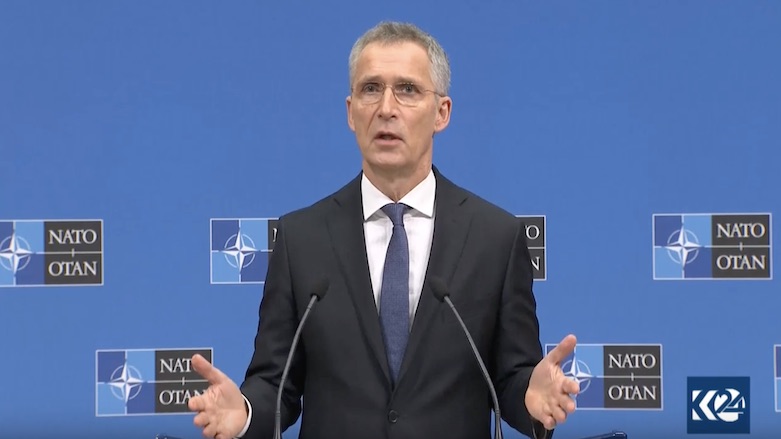NATO chief: 'Negotiated political solution' crucial in northern Syria

ERBIL (Kurdistan 24) – The head of the North Atlantic Treaty Organization (NATO) told reporters on Friday that it is crucial for involved parties to quickly resolve disputes and reach agreement in northern Syria, where Turkish and Turkish-backed forces have been waging an attack against Kurdish-led forces since early October.
“It’s extremely important that we have a negotiated political solution in northern Syria. And in Syria in general,” said Secretary-General Jens Stoltenberg while answering questions asked by Kurdistan 24 reporter Barzan Hassan.
“I know that the UN efforts [are] also addressing the concerns and the issues raised by the Kurdish people.” But, he argued, it wasn’t NATO’s place to resolve such issues.
“We welcome and support UN efforts to find a political solution.”
The NATO chief also welcomed the visit of Masrour Barzani, prime minister of the Kurdistan Region, to Turkey on Thursday.
Read More: Kurdistan's Prime Minister Barzani meets with Erdogan in Ankara
“I think it’s good thing [when] political leaders meet. Especially when we’re faced with political challenges and complex situations, faced in that region,” said Stoltenberg. “And, therefore, we welcome these kinds of meetings.”
Ankara has said it aims to resettle 3.6 million Syrian refugees currently residing in Turkey within a “safe zone” along its southern border, many from other parts of Syria. This has raised concerns by locals of forced displacement and demographic change.
Earlier in the Kurdish-majority Syrian region of Afrin, occupied by Turkey since March 2018, the ethnic composition of the area was changed when Turkey moved in Arab settlers from other regions.
Read More: UN report details large-scale human rights abuses in Afrin
On Nov. 1, Turkish President Recep Tayyip Erdogan met with UN Secretary-General Antonio Guterres to discuss his plans for northern Syria. The UN has said that its refugee agency had established a team that is studying the Turkish proposal to ensure a “voluntary, safe and dignified return” for Syrians displaced by nine years of civil war.
Kurdistan Region Prime Minister Masrour Barzani has voiced his support for Turkey’s cooperation with the UN as part of preparations for any resettlement plan.
“The return of refugees that has to be on the basis of voluntary and safe return of those refugees to their homes,” he said.
However, there are concerns that Turkey is forcefully deporting refugees to the war-torn country of Syria, which is forbidden by international law.
“Turkey’s claim that refugees from Syria are choosing to walk straight back into the conflict is dangerous and dishonest. Rather, our research shows that people are being tricked or forced into returning,” read a report released in late October by Amnesty International.
Read More: Turkey illegally deports refugees into conflict zones in northern Syria: Amnesty
“Returns until now have been anything but safe and voluntary – and now millions more refugees from Syria are at risk.”
The news website of the Kurdish National Council (KNC) in a report on Sunday said Turkey has already begun a large campaign to repatriate Syrian refugees now in Istanbul, Malatya, Antalya, Gaziantep, Urfa, Izmir, Antakya, and other cities.
Editing by John J. Catherine
